牛津译林版九年级上册Unit 2《Colour》(Reading 2)教案
- 格式:doc
- 大小:74.00 KB
- 文档页数:2
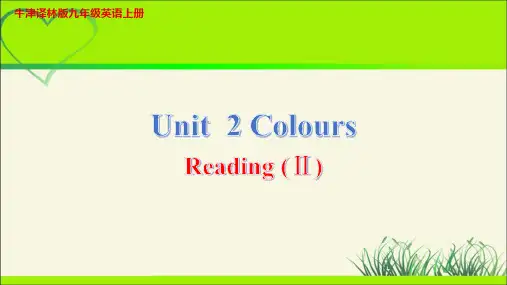
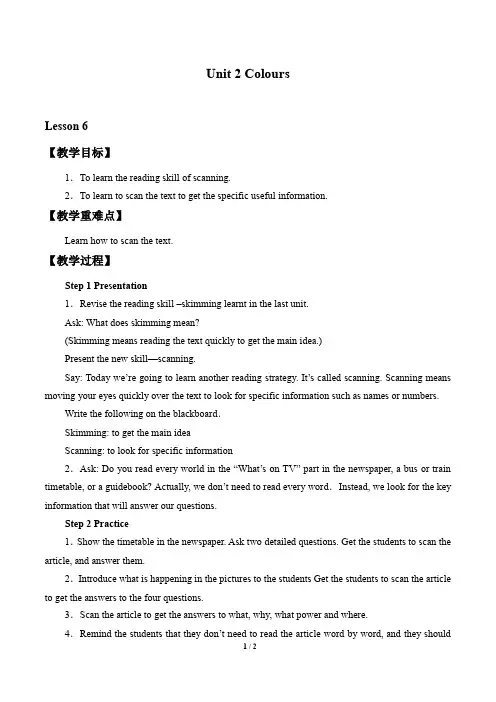
Unit 2 ColoursLesson 6【教学目标】1.To learn the reading skill of scanning.2.To learn to scan the text to get the specific useful information.【教学重难点】Learn how to scan the text.【教学过程】Step 1 Presentation1.Revise the reading skill –skimming learnt in the last unit.Ask: What does skimming mean?(Skimming means reading the text quickly to get the main idea.)Present the new skill—scanning.Say: Today we’re going to learn another reading strategy. It’s called scanning. Scanning means moving your eyes quickly over the text to look for specific information such as names or numbers.Write the following on the blackboard.Skimming: to get the main ideaScanning: to look for specific information2.Ask: Do you read every world in the “What’s on TV” part in the newspaper, a bus or train timetable, or a guidebook? Actually, we don’t need to read every wor d.Instead, we look for the key information that will answer our questions.Step 2 Practice1.Show the timetable in the newspaper. Ask two detailed questions. Get the students to scan the article, and answer them.2.Introduce what is happening in the pictures to the students Get the students to scan the article to get the answers to the four questions.3.Scan the article to get the answers to what, why, what power and where.4.Remind the students that they don’t need to read the article word by word, and they shouldfinish reading it quickly.5.Check the answers.Step 3 Homework1.Revise the words and phrases.2.Finish Workbook.3.Preview Task.。
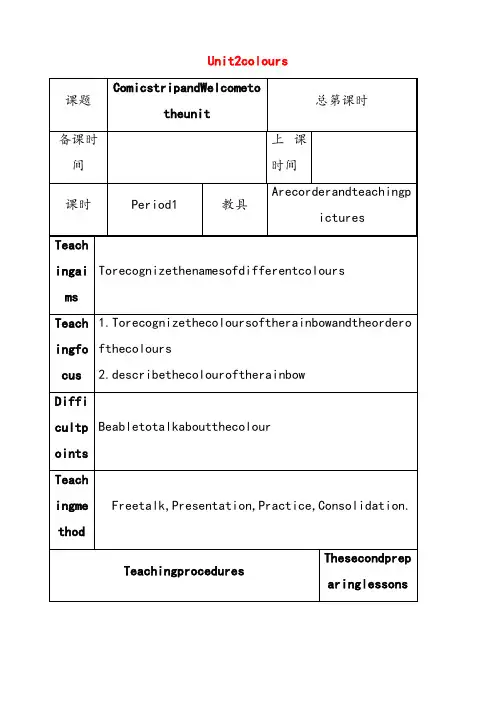
Unit2coloursratherchoosepurplethanred. Askthestudentstomakethesamesentences. Step5ListeningandAnsweringOneday,HoboplayedatrickonEddie.Whathapp ened?Let’slookatthepictureswhilelisteningtothetape.1.WhywouldEddieratherwearbluethanpink?2.DoesEddielookniceonblue?Whynot?3.HobosaystoEddie,“Bluelooksgoodonyou .”Doeshereallythinkso? ThejokehereisthatEddieismaleandchoosesblue thinksthisisamasculinecolor.However,theblu othingturnsouttobeadress.Hoboisdeliberatel misleadEddiebynotshowingortellinghimthatit Step7ReadingandActing Readthedialogueafterthetape,thenreadita ndactitout.Step8ConsolidationExercise1.Howmanycolo ursarethereina__________(彩虹)?Step8ConsolidationExercises改写句子1.There’snothingwrongwithyoureyes.(改为同义句)There___________________wrongwithyou reyes.2.Theyhavealreadyseenthatfilm.(改为否定句)They_________seenthatfilm_________. 3Bluelooksgoodonher.(改为同义句)She_____________good_____________blu e.找出错误并在横线上改正1.Weallthinkpinkisagirlcolor._____________2.Doyoukno whowmanycolorsarethereinarai nbow? _____________3.Therewillhaveabasketballmatchtomorrow . ______________4.Aftertherain,Millielooksoutofthewindo wandseearainbow. ______________Step9Homework1.Revisetoday’sphrases.2.Readandrecitethedialogue.TeachTeachingnotes课题Reading2 总第课时备课时间上课时间课时Period3 教具ArecorderandteachingpicturesTeach ingai ms Torevisevocabularyandexpressionstodescribecolou ratthesametime,learnmorenewwordsandphrases.Teach ingfo cus 1.Torevisevocabularyandexpressionstodescribecol our2.TopracticethemainlanguagepointsofthecontextDiffi cultp oints Tolearnsomeusefulexpressionsandusethemindiffere ntcontextTeachingmethodFreetalk,Presentation,Practice,Consolidation.Teachingprocedures Thesecondpreparinglessons Step1Revision1.Haveadictation.2.Askthefollowingquestions:(1)Howmanykindsofcolorsdoyouknow?(2)Whatdoblueandwhitebelongto?(3)Whyiswearingblueclothesorsleepinginabluer forthemindandbody?(4)Whatcanbluerepresent?(5)Whenshouldyouwearwhite?(6)Whatdoorangeandyellowbelongto?(7)Whatdoesorangerepresent?Whatcanitbringyou(8)Whendopeopleliketouseyellow?(9)Whatdoesgreenbelongto?Whatdoesitrepresent(10)Whatdoesredbelongto?Whatdoesitrepresent?(11)Whencanredhelpyou?Forstrongerclasses,askthestudentstointrodu cewhatdifferentcolorsrepresentandhowtheyaffectus.Step2ReadingandPracticingReadthepassage,andthenaskthestudentstodescribethedifferentkindsofcolorsonebyone.Then askthetopstudentstoretellthewholepassage.T heweakerstudentscanretellthepassageaccordi ngtothetable.Step3Presentation Millieisthinkingaboutherfriends.Sheistryin gtofigureoutwhichcolorsmatchtheircharacter isticsbest.Helpherdecidewhichthebestcolors areforherfriends.FinishtheexerciseinpartC1 onpage29.(Explainwhytheychoosesuchanswers.)1.yellow(‘goodmarks’——wisdom)2.blue(‘helppeoplecalmdown’)3.white(‘worryalot,getstressed’)4.red(‘astrongpersonality,leader’——power)5.green(‘feeltired’——makeyoufeelenergetic Step4PracticeThereisaquestionnaire.Fillintheblankswithy ourowninformationtoseeifyourfavoritecolormatchesyourcharacteristics.Step5ExtensionActivity Askthestudentstowriteaboutoneoftheirfriend9AUnit2coloursons Step1Lead-in Givethemsomesentencestoseeiftheyunderstand.1.Askhimifhecancome.2.Wedon’tknowwhetheritwillrain.3.Theywonderifthematchwillbeheldtomorrow.4.Heisnotsureifhecandothejobwell.5.Shecan’tdecidewhetherthedresslooksniceonher. Makesurethattheyknowthemeaningofifandwhether.Step2Presentation1Askthemtoreadthroughpage27andtellthestu dentsthatweuseiforwhethertointroduceanob jectclausewhichexpressesayes/noquestion s.ReadthesentencesanddoPartB1. Payattentiontothewordorderanditshouldbet hesameasthatinastatement.Checktheanswers.Step3Practice1.Domoreexercisestopractice.(1).Theywonder WillMissLibeinchargeoftheirclass? (2).Doyouremember Hasheenteredthecontest?.(3).Iaskhim Doyouoftencomeheretoreadnewspaper? (4).IwanttoknowIsheaLeaguemember?Checktheanswers. Finishtheexercisesonpage28andthencheckth eanswers.Step4homework2.Domoreexercises.1.FinishUnit2period5onAssessmentBook.2.ReadandrecitetheshortpassageinPartB2.Teachingnotes课题Integratedskills总第课时上课时年月日第周星期间课时Period6 教具Arecorder●Tounderstandhowacolourtherapistdoes●TogetinformationfromaprintedadvertisementTogetfurtherinformationfromaTVinterview.MainpointsandDifficultpoints:●ToconsolidatetheinformationgainedfromreadingandlisteninganddeterminethefactsTeachingmethod:Task-basedapproach,ScenepedagogyandTeachingwithhumorTeachingProcedures:Personaldesign Step1aninterviewQuestion1:Howdoyoufeelatthebeginningofthenewterm?Idiscoverthatdifferentstudentshavedifferentmoodsduringtheterm.Thistermisveryspecial.Youmustworkharderforyouridealhighschool,collegeandbrightfuture.I7Extensionactivity IfoundanadvertisementontheInternet. Wanted:Part-timemodels.Females(aged14-25 tisements.Mustbeatleast1.6mtall.Shouldbe veagoodsmile.CallSuperModelAgencyon55568 Whatinformationcanyouget?Thendividest udentsinto4groups.Eachgroupmustmakeup anadvertisementandthenreadittotheothe rgroupsandletthemgetsomeinformation.8Consolidation改写句子1.ThetrousersaresotightthatIcan’twea rthem.(改为同义句)Thetrousersare_________tight_________ wear.2.Shecanmakeyourelaxed.(改为同义句)She________________________makeyourel axed.3.Idon’tknowwhatIcanwear.(改为同义句)Idon’tknow_________________wear.4.Hehasknownmesince last year.(对划线部分提问)_________________hasheknownyou?9Homework1. Revisethewordsandthephrases.2.Domoreconsolidationexercises.(1)她使用的油有不同的颜色。
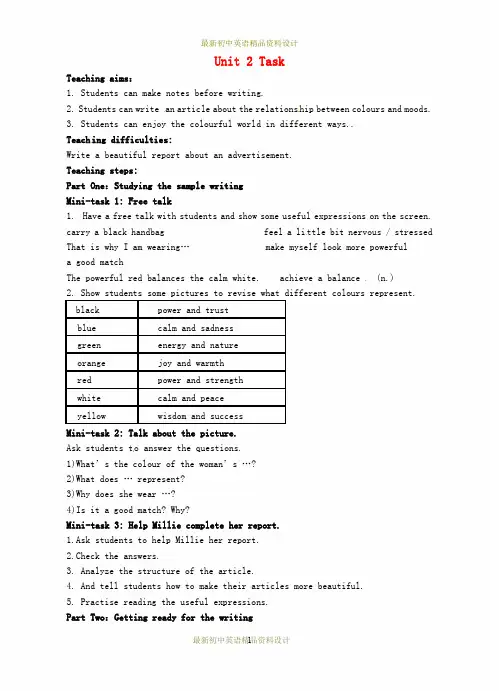
Unit 2 TaskTeaching aims:1. Students can make notes before writing.2. Students can write an article about the relations hip between colours and moods.3. Students can enjoy the colourful world in different ways..Teach ing difficulties:Write a beautiful report about an advertisement.Teaching steps:Part One:Studying the sample writingMini-task 1: Free talk1.Have a free talk with students and show some useful expressions on the screen. carry a black handbag feel a li ttle bit nervous / stressed That is why I am wearing… make myself look more powerfula good matchThe powerful red balances the calm white. achieve a balance (n.)2. Show students some pictures to revise what different colours represent. black power and trustblue calm and sadnessgreen energy and natureorange joy and warmthred power and strengthwhite calm and peaceyellow wisdom and successMini-task 2: Talk about the picture.Ask students t o answer the questions.1)What’s the colour of the woman’s …?2)What does … represent?3)Why does she wear …?4)Is it a good match? Why?Mini-task 3: Help Millie complete her report.1.Ask students to help Millie her report.2.Check the answers.3. Analyze the structure of the article.4. And tell students how to make their articles more beautiful.5. Practise reading the useful expressions.Part Two:Getting ready for the writing1. Play a short vid eo of a fruit advertisements.2. Talk about the fruit advertisement on students’ book.3. Discuss in groups about the mobile advertisement.1). Where? What is the boy doing?2). What is he wearing?3). What does each colour represent?4). How does the boy feel?5). What’s your feeling about the advertisement?4. Ask students to make some notes on the paper.5. S how them more notes, and ge t students to say something about the advertisement Part Three: While-writing1. Ask students to write their own articles.2. Give them some useful expressions to choose from.3. Ask them to check their writing with the standards.Part Four:Sho w time1. Show two articles on the screen.2. Ask other students to discuss in groups to give their scores and reasons.3. Enjoy a sample writing. Ask students to find out the details they like.4. Give students some advice .Homework:Please rewrite the article.2014/9/25。
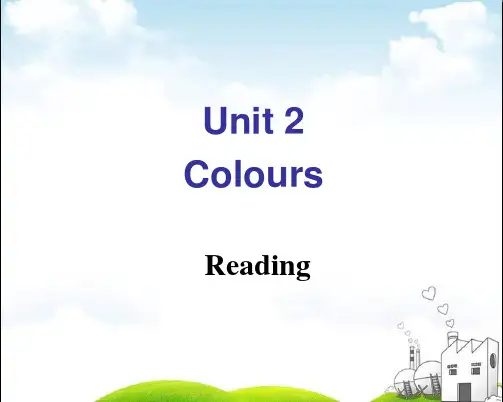
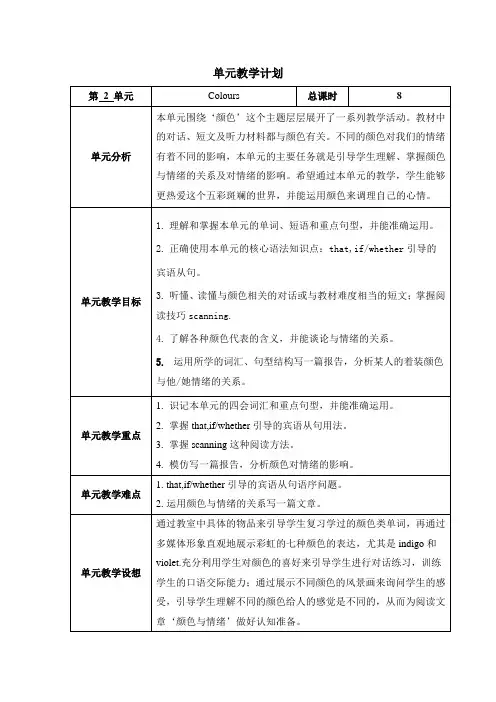
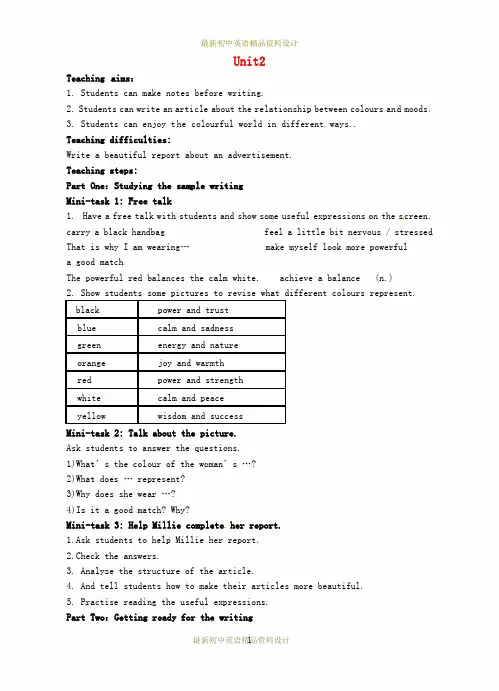
Unit2Teaching aims:1. Students can make notes before writing.2. Students can write an article about the relationship between colours and moods.3. Students can enjoy t he colourful world in different ways..Teaching difficulties:Write a beautiful report about an advertisement.Teaching steps:Part One:Studying the sample writingMini-task 1: Free talk1.Have a free talk with students and show some useful expressions on the screen. carry a black handbag feel a little bit nervous / stressed That is why I am wearing… make myself look more powerfula good matchThe powerful red balances the calm white. achieve a balance (n.)2. Show students some pictures to revise what different colours represent. black power and trustblue calm and sadnessgreen energy and natureorange joy and warmthred power and strengthwhite calm and peaceyellow wisdom and successMini-task 2: Talk about the picture.Ask students to answer the questions.1)What’s the colour of the woman’s …?2)What does … represent?3)Why does she wear …?4)Is it a good match? Why?Mini-task 3: Help Millie complete her report.1.Ask students to help Millie her report.2.Check the answers.3. Analyze the structure of the article.4. And tell students how to make their articles more beautiful.5. Practise reading the useful expressions.Part Two:Getting ready for the writing1. Play a short video of a fruit advertisements.2. Talk about the fruit advertisement on students’ book.3. Discuss in groups about the mobile advertisement.1). Where? What is the boy doing?2). What is he wearing?3). What does each colour represent?4). How does the boy feel?5). What’s your feeling about the advertisement?4. Ask students to make some notes on the paper.5. Sh ow them more notes, and get students to say something about the advertisement Part Three: While-writing1. Ask students to write their own articles.2. Give them some useful expressions to choose from.3. Ask them to check their writing with the standards.Part Four:Show time1. Show two articles on the screen.2. Ask other stud ents to discuss in groups to give their scores and reasons.3. Enjoy a sample writing. Ask students to find out the details they like.4. Give students some advice .Homework:Please rewrite the article.。
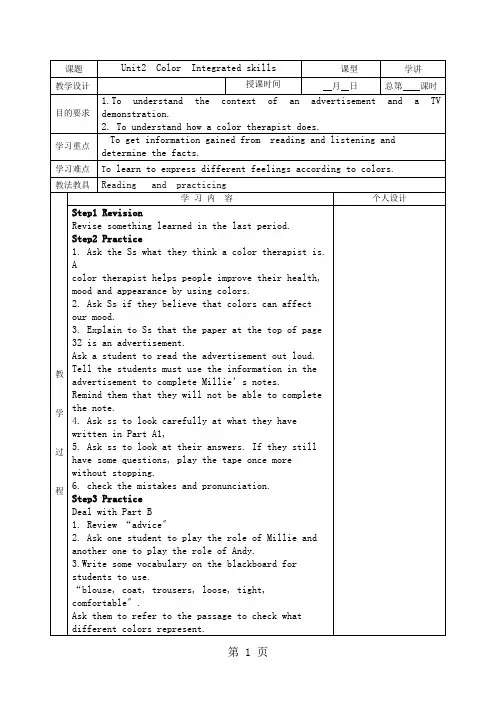
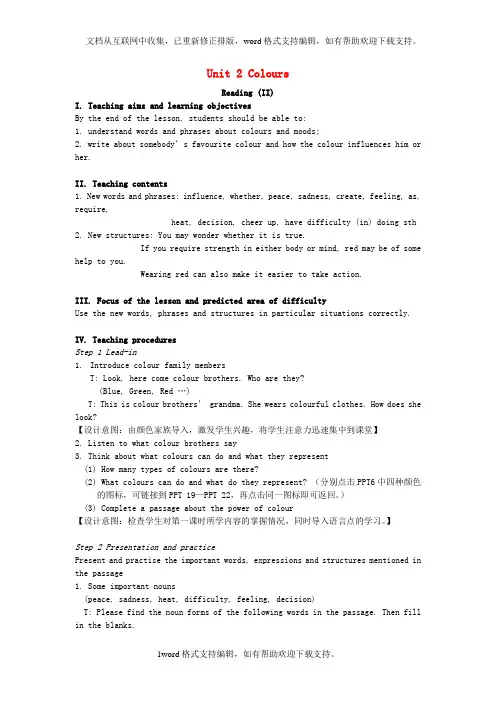
Unit 2 ColoursReading (II)I. Teaching aims and learning objectivesBy the end of the lesson, students should be able to:1. understand words and phrases about colours and moods;2. write about somebody’s favourite colour and how the colour influences him or her.II. Teaching contents1. New words and phrases: influence, whether, peace, sadness, create, feeling, as, require,heat, decision, cheer up, have difficulty (in) doing sth 2. New structures: You may wonder whether it is true.If you require strength in either body or mind, red may be of some help to you.Wearing red can also make it easier to take action.III. Focus of the lesson and predicted area of difficultyUse the new words, phrases and structures in particular situations correctly.IV. Teaching proceduresStep 1 Lead-in1.Introduce colour family membersT: Look, here come colour brothers. Who are they?(Blue, Green, Red …)T: This is colour brothers’grandma. She wears colourful clothes. How does she look?【设计意图:由颜色家族导入,激发学生兴趣,将学生注意力迅速集中到课堂】2. Listen to what colour brothers say3. Think about what colours can do and what they represent(1) How many types of colours are there?(2) What colours can do and what do they represent? (分别点击PPT6中四种颜色的图标,可链接到PPT 19—PPT 22,再点击同一图标即可返回。
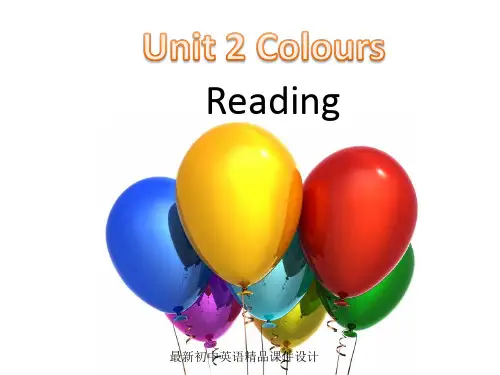
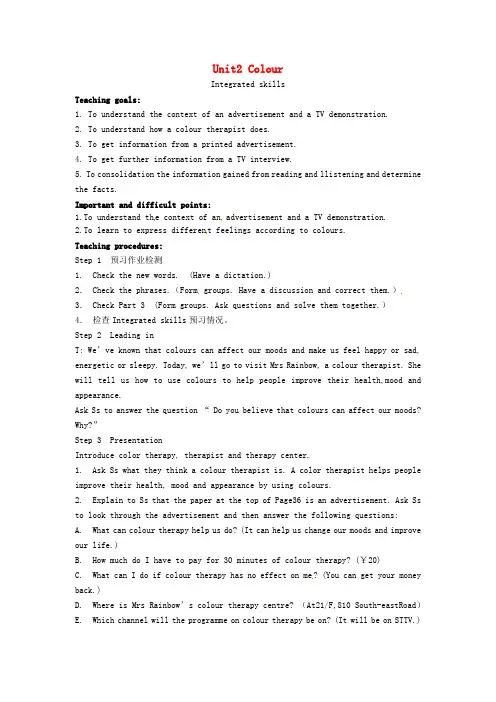
Unit2 ColourIntegrated skillsTeaching goals:1. To understand the context of an advertisement and a TV demonstration.2. To understand how a colour therapist does.3. To get information from a printed advertisement.4. To get further information from a TV interview.5. To consolidation the information gained from reading and llistening and determine the facts.Important and difficult points:1.To understand th e context of an advertisement and a TV demonstration.2.To learn to express differen t feelings according to colours.Teaching procedures:Step 1 预习作业检测1. Check the new words. (Have a dictation.)2. Check the phrases.(Form groups. Have a discussion and correct them.)3. Check Part 3 (Form groups. Ask questions and solve them together.)4.检查Integrated skills预习情况。
Step 2 Leading inT: We’ve known that colours can affect our moods and make us feel happy or sad, energetic or sleepy. Today, we’ll go to visit Mrs Rainbow, a colour therapist. She will tell us how to use colours to help people improve their health,mood and appearance.Ask Ss to answer the question “ Do you believe that colours can affect our moods? Why?”Step 3 PresentationIntroduce color therapy, therapist and therapy center.1. Ask Ss what they think a colour therapist is. A color therapist helps people improve their health, mood and appearance by using colours.2. Explain to Ss that the paper at the top of Page36 is an advertisement. Ask Ss to look through the advertisement and then answer the following questions:A. What can colour therapy help us do? (It can help us change our moods and improve our life.)B. How much do I have to pay for 30 minutes of colour therapy? (¥20)C. What can I do if colour therapy has no effect on me? (You can get your money back.)D. Where is Mrs Rainbow’s colour therapy centre? (At21/F,810 South-eastRoad)E. Which channel will the programme on colour therapy be on? (It will be on STTV.)Step 4 Practice1. Ask Ss to read the advertisement out loud. Tell Ss to use the information in the adverti sement to complete Millie’s notes. Remind them that they will not be able to complete the note.2. Ask Ss to look carefully at what they have written in Part A1, and pay attention to the gaps they have not yet been able to f ill in.3. Ask Ss to listen to the tape carefully . If they still have some questions, play the tape once more without s topping.4. Check the mistakes and pronun ciation.Step 5 PracticeT: Mrs Rainbow knows a lot about colour therapy. Millie wants to see Mrs Rinbow but she is afraid to go alone, so she asks Amy to go with her. Ask Ss to listen to the conversation between Millie and Amy.1. Ask Ss to read A32. Play the tape and ask Ss to listen.3. Play the tape again and ask Ss to choose the correct answers.A. What does Mrs Rainbow do , Millie?B. Really? How does she do that?C. I’m feeling very tired this week.. What should I do to get a good night’s sleep?D. Daniel is not happy this week. What should he do?E. What other kinds of colour therapy does Mrs Rainbow do?F. I’d l ike to try it, but what if the therapy doesn’t work?4. Check their answers.Step 6Homework1. Recite the words and phrases.2. Finish the exercises .3. Prepare for the next period.【Teaching reflection】。
牛津译林版九年级上册Unit2《Colour》(Grammar)教案Unit 2 ColourGrammarTeaching goals:1.Learn to use object clauses introduced by that.2.Learn to use object clauses introduced by if or whether.Important and difficult points:1.Learn to use object clauses introduced by that.2.Learn to use object clauses introduced by if or whether.Teaching procedures:Step 1 Lead in.Enjoy a song called ‘Dad,where are we going?’I kn ow (that) this program is very popular now.We can see (that) the five children have changed a lot in the program.It shows (that) the super star Dads have to finish the tasks together with their children.I’m glad that my favourite star Jimmy Lin is in it.We believe (that) the program will become hotter in the future.I hope (that) I will have a chance to go there.Subject + Verb/b e adj. + (that) clause.Object clauses introduced by thatStep2 Presentation.An object clause fun ctions as the object of a sentence. We use that to introduce an object clause that is a statement.An object clause can be put after verbs such as say, find, know, think, believe, hope, notice and mean.e.g.Some people believe that colours can influence our moods.She hopes that yellow can bring her success.An object clause can also follow adjectives such as certain, sure and glad.e.g.He is glad that the walls in his room are blue.She is sure that yellow can bring her good luck.Step3 PracticeSandy is chatting online with Millie about room colours. Try to add that to each object clause.Millie: Did you know t here is a relationship betweencolours and moods?Sandy: Certainly. I think colours influence our everydaylives in man y ways.Millie: How should we choose the colours for the roomsof a house?Sandy: Most people think light colours are better thandark ones.Millie: Yes. I notice light colours make rooms seem l arger.Sandy: Sure. I also know blue can make us feel relaxedMillie: Yes. My mum says blue is suitable for bedrooms.I also find some people prefer orange for theirdining rooms.Sandy: True, but it depends on personal taste. Anyway,we should choose the colour which makes us fellcomfortable.Step4 Extension.When the main clause uses the simple present tense or future tense, the object clause still uses the original tense.e.g. I don’t think (that) you are right.2. When the main clause uses the simple past tense, the tense in the object clause should be changed into the corresponding past tense.e.g. He told me (that) he would go back home soon.3. When the object clause is used to express the objective facts, truths, proverbs or n atural phenomena, we still use the original tense.e.g. My grandpa told me (that) the earth is round.Step 5 Exercises1.She knows. Timmy is a good boy.2. His fathe r said. One and one is two.3. He said. Lucy often goes shopping.4. He is doing his homework. He said.5. We realize. We should work hard.【Teaching reflection】。
牛津译林版九年级上册Unit 2《Colour》教学设计5一. 教材分析本单元以颜色为主题,通过描述不同颜色和物品的关系,让学生学习并掌握相关词汇和表达方式。
教材内容丰富,插图生动,贴近学生生活,有利于激发学生的学习兴趣。
本节课的教学内容为Unit 2《Colour》中的第三个课时,主要学习红、橙、黄、绿、蓝五种颜色的表达以及它们与日常物品的搭配。
二. 学情分析九年级的学生已经具备一定英语基础,对颜色类词汇有一定的了解。
但部分学生对颜色与物品搭配的表达能力较弱,需要加强练习。
此外,学生的阅读兴趣有待提高,需要通过丰富多样的教学活动激发他们的学习热情。
三. 教学目标1.知识目标:学生能够掌握红、橙、黄、绿、蓝五种颜色的英文表达,以及它们与日常物品的搭配。
2.能力目标:学生能够在实际情境中运用所学颜色词汇进行描述和交流。
3.情感目标:培养学生对色彩的感知和欣赏能力,提高他们对英语学习的兴趣。
四. 教学重难点1.重点:红、橙、黄、绿、蓝五种颜色的英文表达及其与日常物品的搭配。
2.难点:颜色词汇在实际情境中的运用和搭配能力的培养。
五. 教学方法1.任务型教学法:通过完成各种任务,让学生在实践中学习和运用颜色词汇。
2.情境教学法:创设各种情境,帮助学生理解和记忆颜色词汇及搭配。
3.游戏教学法:通过趣味游戏,激发学生的学习兴趣,提高他们的参与度。
六. 教学准备1.教材:牛津译林版九年级上册Unit 2《Colour》2.多媒体设备:投影仪、PPT、录音机、磁带3.教具:颜色卡片、物品图片、实物道具4.作业:相关颜色词汇的练习题七. 教学过程1.导入(5分钟)利用PPT展示五颜六色的图片,引导学生谈论颜色,激发学生的学习兴趣。
2.呈现(5分钟)教师展示颜色卡片,依次呈现红、橙、黄、绿、蓝五种颜色,引导学生跟读并记忆。
3.操练(10分钟)教师分别拿出与五种颜色相关的物品(如红玫瑰、橙子、黄香蕉、绿树叶、蓝天空),引导学生用英语描述这些物品的颜色。
牛津译林版九年级上册Unit 2《Colour》说课稿1一. 教材分析《牛津译林版九年级上册Unit 2 Colour》是一篇关于颜色的文章,通过描述不同颜色给人带来的不同感受和情绪,引导学生学习颜色词汇和表达颜色的相关句型。
文章内容丰富,贴近生活,有利于激发学生的学习兴趣和积极性。
本节课的主要目标是让学生能够熟练运用所学颜色词汇和句型进行交流。
二. 学情分析九年级的学生已经具备了一定的英语基础,对于日常生活中的基本颜色词汇和句型有所了解。
但部分学生在表达颜色和情感之间的关系方面还存在一定的困难。
因此,在教学过程中需要关注这部分学生的学习需求,并通过分层教学和个别辅导的方式帮助他们提高。
三. 说教学目标1.知识目标:让学生掌握颜色词汇(red, yellow, blue, green, white,black, purple, orange, grey, brown)和表达颜色的句型(What colour is it?It’s…; I like…; Colours can make us feel…)。
2.能力目标:培养学生能够用英语描述颜色的能力,并能够运用所学知识进行情景交际。
3.情感目标:通过学习颜色词汇和句型,培养学生对色彩的感知和欣赏能力,提高他们对生活的热爱。
四. 说教学重难点1.教学重点:颜色词汇的掌握和运用。
2.教学难点:表达颜色和情感之间关系的句型。
五. 说教学方法与手段1.教学方法:采用任务型教学法,通过各种任务活动让学生在实践中学习和运用颜色词汇和句型。
2.教学手段:利用多媒体课件、图片、实物等辅助教学,提高学生的学习兴趣和积极性。
六. 说教学过程1.导入:以一首关于颜色的英文歌曲《Colourful World》导入新课,激发学生的学习兴趣。
2.呈现:展示不同颜色的图片,引导学生说出相应的颜色词汇,并板书颜色词汇。
3.学习:通过不同任务活动,让学生练习使用颜色词汇进行描述,如:填空、 pr work、group work等。
苏教牛津译林初中英语重点知识精选掌握英语语法知识,巩固词汇量和各种语态,学好英语基础一定要扎实,大家一起练习吧!牛津译林初中英语和你一起共同进步学业有成!Unit2 Colour总课题 9A Unit2 Colour总课时10 第9 课时课题 Main task课型新授知识目标To master the words: protection, warmth, powerful, handbag, balance能力目标1.To organize ideas and build a plan.2.To write a report about moods and colors and what they represent.3. To present a report.教学目标情感目标To learn to express ideas to others.教学难点1.To organize ideas and build a plan. 2.To write a report about moods and colors and what they represent. 3. To present a report.教(学)过程教(学)活动自主个案预习导学句型转换1. Can you tell me how I can change the film on the camera?Can you tell me _______ _____ _______ the film on the camera?2. He found that it was difficult to make a decision.He found __________ __________ to make a decision.3. I prefer staying at home to going out.I ______ _______ stay at home ______go out.教学过程Step1 Revision Revise something learned in the last period.Step2 Presentaton1. Explain the context. Students are working on a project about the relationship between colors and moods. They will look at pictures of people and assess their moods based on the colors they are wearing.2. Tell students that making a list can be a good way to organize their thoughts and ideas.Step3 Practice1. Tell students to look at the picture carefully, then answer some questions. After answering some questions, let them work in groups to finish the report.Step 4 Assignment1. Revise this period2. Pre-learn the next period More exercises make perfect Homework课内研讨( ) 1. He is not ________ in the film, though most of us think it isvery ________.A. int erested; interestedB. interested; interestingC. interesting; interestedD. interesting; i nteresting( ) 2. He didn’t know _________ his father wanted him _______ at the meeting.A. What; to speakB. how; to sayC. what; to sayD. what;say( ) 3. Well, do what we can ___________ these students with their English study.A. to helpB. helpC. be helpedD. be helping( ) 4. It’s not my blouse. It may be _______________.A. someone elseB. someone else’sC. else someoneD. someone’selse训练巩固选择填空( ) 1. There’s with your son’s ears. So don’t worry abouthim.A. nothing seriousB. something seriousC. serious nothingD. anything serious( ) 2. Most childre n ice cream fruit.A. would rather; toB. prefer; toC. prefer to; rather thanD. like; better( ) 3. The boy ____ short hair looks lovely in black and white T-shirt.A. hasB. haveC. withD. is( ) 4. Colours can make us ____ or sad.A. feel relaxB. to feel relaxedC. feel relaxedD. tofeel relax拓展延伸翻译下列句子1. 当你累的时候,你可以闭上眼睛放松一会儿自己.Whe n you _________ ________,you can close your eyes and __________________ for a while.2. 自从他开始工作就实践颜色治疗法.Sh e _________ ________ _________ _________ since she ______ to work.3. 他今天心情不好。
Unit2 Colour
Reading 1
Teaching goals:
1.To understand what colors represent
2.To recognize and understand vocabulary about emotions Emotion and attitude: To
learn the four people who are outstanding in their fields.
Important and difficult points:
1.To understand what colors represent
2.To recognize and understand vocabulary about emotions
Teaching procedures:
Step 1: Revision
Revise different kinds of colours by asking students:
What’s your favourite colour?
Step 2: Presentation.
Tell students that different colours can give people different feelings.
Let students enjoy a series of pictures, including different kinds of colours and
let students discuss:
What’s your feeling after looking at the pictures?
Encourage students to say as much as possible.
Then teachers make a conclusion:
Blue & white can make people calm and peaceful. Blue can also represent sadness
and white is the colour of purity.
Yellow and orange make you feel warm, happy and contented. Orange represents joy
while yellow is the colour of wisdom.
Green makes you feel energetic. It represents new life and growth.
Red represents power. It is also the colour of heat and strong feelings.
Step3
Part A Teaching procedures
1. Read the passage aloud. Ask students to listen to you carefully and follow the
text on the page.
2. Ask one student at a time to read a paragraph. After each paragraph, ask students
to say which parts of the text they do not understand.
3. Ask more able students what they think about the article. Do they agree with
what it says or which part of it do they like most? Encourage more able students
to give reasons for their answers.
4. Ask students to tell the class any interesting facts they know about the colors.
Part B. Teaching procedures
1. Ask students to read Part A on page 22 and 23 again and use the information to
complete Part B1 on page 24.
2. Ask students to work in pairs to complete Part B2. Ask students to raise their
hands when they have finished. The first pair to finish the exercise correctly is
the winner.
3. After students have finished, give the correct answer to each question.
根据首字母提示完成下列句子:
1. Red represents p __________ and s_____________.
2. Paul has strong p_________ and likes to be the leader.
3. This can help when you have d__________- making a decision.
4. I’d r__________ wear a blue coat than a red coat.
5. Green can give us e_________ because it r___________ new life and growth.
6. White is the color of p________. If you wear white, you will feel p______.
7. Blue can c_______ the feeling of harmony.
8. Is there a_________ in the room? I’m hungry.
9. Do you know that colours can a_________ our moods?
10. Orange can bring you s________ .It can c______ you up when you are sad.
Key:根据首字母提示完成下列句子:
1. power strength 2. personality
3. difficulty 4. rather
5. energy represents 6. purity peaceful
7. creative 8. anything
9. affect 10. success cheer
【Teaching reflection】